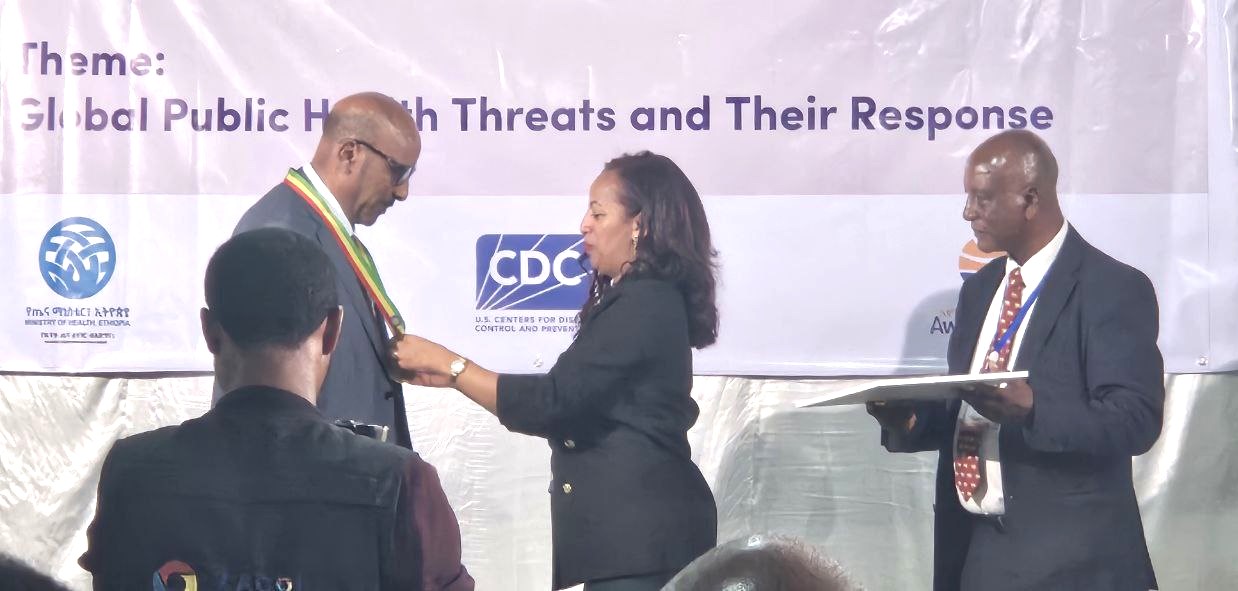
Professor Delenasaw Yewhalaw receiving a Gold Medal from the Ethiopian Public Health Association in March 2025. Credit: Jimma University
A pioneering entomologist and malaria researcher in Ethiopia, Professor Delenasaw Yewhalaw received a pivotal research grant from TDR early in his career, setting the stage for his groundbreaking contributions to the field.
Among Delenasaw's many achievements in the field of malaria research is the discovery of knockdown resistance (kdr) mutations in mosquito populations in Ethiopia. His findings led to the development of an insecticide resistance management strategy by Ethiopia’s National Malaria Elimination Programme.
This is just one example of the impact of his research, which has provided valuable insights into combating infectious diseases, improving healthcare delivery and promoting community health initiatives. As one of Ethiopia’s leading entomologists, he has also been an influential figure in building malaria research capacity in the country, establishing numerous research facilities over the last decade.
Fascination with insects and disease transmission
Delenasaw is currently a professor of medical entomology at the School of Medical Laboratory Sciences, College of Health Sciences, and Founding Director of the Tropical and Infectious Diseases Research Center (TIDRC) at Jimma University in Ethiopia. His deep fascination with insects and how they transmit diseases, sparked during his undergraduate years, led him to pursue a postgraduate programme in entomology at Addis Ababa University. This decision marked the beginning of his journey into the world of infectious disease research.
Upon obtaining his master's degree, Delenasaw began his academic career at Jimma University in 2004. In 2006, as the recipient of a TDR Capacity Strengthening Grant, he led a team as principal investigator to assess the impact of a newly constructed hydropower dam on malaria incidence among children living nearby. “Receiving the grant from TDR was a turning point in my scientific and research career,” he says.
Motivated by the data generated from his research, he pursued a PhD in Medical Sciences at Université catholique de Louvain in Brussels, Belgium.
Upon returning to Ethiopia in 2012, Delenasaw was struck by the lack of researchers in malaria and other vector-borne illnesses as well as the absence of laboratories and research centres for young scientists. He was determined to address these issues. Building on his earlier successes, he won several grants to establish the Tropical & Infectious Diseases Research Center (TIDRC) at Sekoru, Ethiopia. This center, equipped with state-of-the-art facilities, became a hub for infectious diseases research in Ethiopia and beyond. Researchers dubbed it "Science in the Jungle” or “Jungle Science" due to its isolated location amid hills and bushes.
With grants from the U.S. National Institutes of Health, the United States Agency for International Development and other funders, he went on to establish numerous other research facilities, including the International Center of Excellence for Malaria Research (ICEMR) Laboratories at Arjo-Didessa with partners from University of California, Irvine.
A commitment to mentorship
Mentoring young scientists and researchers locally and internationally is a priority for Delenasaw, who has mentored 86 master’s and 21 doctoral students. He also co-developed the "Health Research Mentorship in low- and middle-income countries (HERMES): a TDR Global practical guide to spur mentorship institutionalization," spearheaded jointly by the TDR Global Ethiopia Node and the Armauer Hansen Research Institute (AHRI).
Delenasaw has developed curricula for PhD and MSc programmes in tropical and infectious diseases, public health entomology and vector control and bioinformatics. These programmes aim to produce high-level professionals in infectious diseases and bioinformatics. He also co-developed a distance education training programme at Jimma University.
Innovative Research
Delenasaw continues to pursue innovative research. In 2024, with colleagues from John Hopkins University and University of California, Irvine, he generated and published the first reference genome sequence of P. vivax from Ethiopia, which is also the first P. vivax genome assembly from Africa. He also described P. vivax infection in Duffy negative Africans together with colleagues from University of North Carolina.
Currently, he is working on the ecology and control of an exotic invasive malaria vector, Anopheles stephensi, urban malaria epidemiology in a changing climate and a project on AI-based infectious disease outbreak and transmission risk prediction, among other research projects.
For his outstanding contributions to public health research, the Ethiopian Public Health Association honored Delenasaw with a prestigious Gold Medal and Certificate in March 2025.

